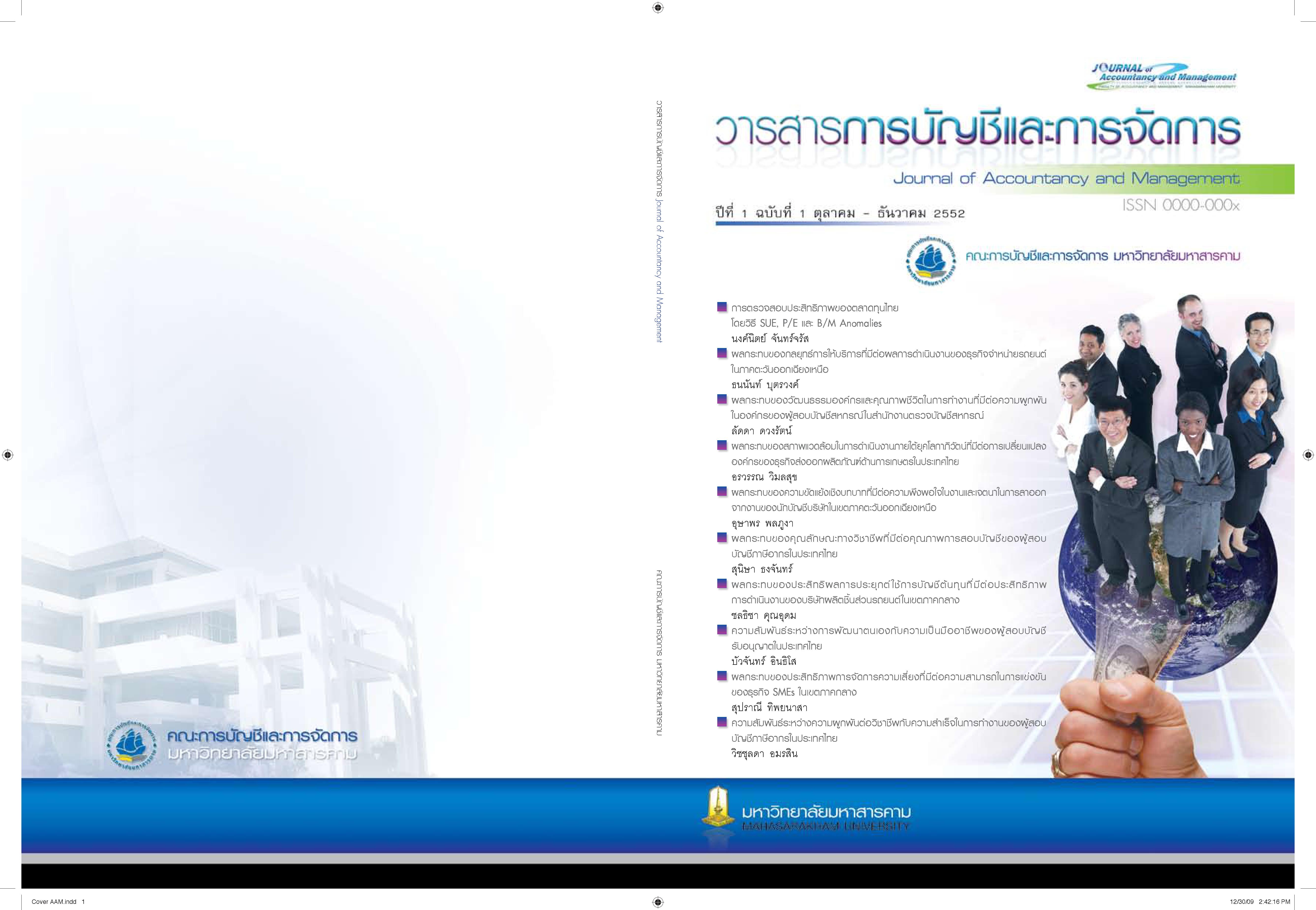ความสัมพันธ์ระหว่างการพัฒนาตนเองกับความเป็นมืออาชีพ ของผู้สอบบัญชีรับอนุญาตในประเทศไทย
Main Article Content
บทคัดย่อ
การวิจัยครั้งนี้มีวัตถุประสงค์ เพื่อทดสอบความสัมพันธ์ระหว่างการพัฒนาตนเองกับความเป็นมืออาชีพ
ของผู้สอบบัญชีรับอนุญาตในประเทศไทย โดยใช้แบบสอบถาม เป็นเครื่องมือในการเก็บรวบรวมข้อมูลจากผู้สอบบัญชีรับอนุญาตในประเทศไทย จำนวน 264 คน สถิติที่ใช้ในการวิเคราะห์ข้อมูล ได้แก่ การวิเคราะห์สหสัมพันธ์พหุคูณ และการวิเคราะห์การถดถอยแบบพหุคูณ ซึ่งการพัฒนาตนเองได้ถูกกำหนดให้เป็นตัวแปรอิสระที่มีความสัมพันธ์และผลกระทบต่อความเป็นมืออาชีพ ผลการวิจัย พบว่า 1) การพัฒนาตนเองด้านการเรียนรู้มีความสัมพันธ์และผลกระทบเชิงบวกกับความเป็นมืออาชีพโดยรวม ด้านความเชี่ยวชาญในวิชาชีพ ด้านความคิดสร้างสรรค์ และด้านความเชื่อมั่นในตนเอง 2) การพัฒนาตนเองด้านความคิด มีความสัมพันธ์และผลกระทบเชิงบวกกับความเป็นมืออาชีพโดยรวม ด้านความเชี่ยวชาญในวิชาชีพ และด้านความคิดสร้างสรรค์ 3) การพัฒนาตนเองด้านการสื่อสารมีความสัมพันธ์และผลกระทบเชิงบวกกับความเป็นมืออาชีพโดยรวม ด้านความเชี่ยวชาญในวิชาชีพ ด้านความสัมพันธ์กับผู้เกี่ยวข้อง และด้านความเชื่อมั่นในตนเอง และ 4) การพัฒนาตนเองด้านภาวะผู้นำมีความสัมพันธ์และผลกระทบเชิงบวกกับความเป็นมืออาชีพโดยรวม ด้านความเชี่ยวชาญในวิชาชีพ ด้านความคิดสร้างสรรค์ ด้านความสัมพันธ์กับผู้เกี่ยวข้อง และด้านความเชื่อมั่นในตนเอง
Downloads
Article Details
บทความที่ได้รับการตีพิมพ์เป็นลิขสิทธิ์ของวารสารการบัญชีและการจัดการ
ข้อความที่ปรากฏในบทความแต่ละเรื่องในวารสารวิชาการเล่มนี้เป็นความคิดเห็นส่วนตัวของผู้เขียนแต่ละท่านไม่เกี่ยวข้องกับมหาวิทยาลัยมหาสารคาม และคณาจารย์ท่านอื่นๆในมหาวิทยาลัยฯ แต่อย่างใด ความรับผิดชอบองค์ประกอบทั้งหมดของบทความแต่ละเรื่องเป็นของผู้เขียนแต่ละท่าน หากมีความผิดพลาดใดๆ ผู้เขียนแต่ละท่านจะรับผิดชอบบทความของตนเองแต่ผู้เดียว
เอกสารอ้างอิง
กรมกรมพัฒนาธุรกิจการค้า. พระราชบัญญัติวิชาชีพบัญชี พ.ศ. 2547. ค้นเมื่อ 25 พฤศจิกายน 2551. จาก
กรมกรมพัฒนาธุรกิจการค้า. (2550). รายชื่อผู้สอบบัญชีรับอนุญาต. http://www.dbd.go.th. 20 พฤศจิกายน 2551.
ชาติ แจ่มนุช. (2545). สอนอย่างไรให้คิดเป็น. โรงพิมพ์เลี่ยงเชียง.
ชูชัย สมิทธิไกร. (2540). การฝึกอบรมบุคลากรในองค์การ. กรุงเทพฯ : จุฬาลงกรณ์มหาวิทยาลัย.
นฤมล สุ่นสวัสดิ์. (2549). การพัฒนาประสิทธิภาพในการทำงาน. กรุงเทพฯ : สำนักพิมพ์วันทิพย์.
นิพาดา เทวกุล. (2551). ความคิดสร้างสรรค์. ค้นเมื่อ 11 พฤศจิกายน 2551 : จาก
เนตร์พัณณา ยาวิราช. (2550). ภาวะผู้นำและผู้นำเชิงกลยุทธ์. กรุงเทพฯ : บริษัทเซ็นทรัลเอ็กซ์เพรส จำกัด.
บุญชม ศรีสะอาด. (2545). การวิจัยเบื้องต้น. กรุงเทพฯ : สุวีริยาสาส์น.
ปริญญา วงษ์พินิจ. (2546). การบริหารความเสี่ยงเพื่องานตรวจสอบบัญชี. วิทยาลัยนวัตกรรมอุดมศึกษา มหาวิทยาลัยธรรมศาสตร์.
พยอม สิงห์เสน่ห์. (2548). การสอบบัญชี. กรุงเทพฯ : ห้างหุ้นส่วนจำกัด โรงพิมพ์ ชวนพิมพ์.
เพ็ชรมน แสงจักร. (2549). ความสามารถทางการคิดของนักศึกษาประกาศนียบัตรวิชาชีพ ปีที่ 2 วิทยาลัยอาชีวศึกษาเชียงใหม่ ที่ได้รับการสอนตามแนวคิดของเสติร์นเบอร์ก. วิทยานิพนธ์ มหาวิทยาลัยเชียงใหม่.
วิบูลย์ จุง. (2551). การพัฒนาตนเองเพื่อความสำเร็จ. ค้นเมื่อ 10 มิถุนายน 2551.จาก
สภาวิชาชีพบัญชี. (2551). พระราชบัญญัติวิชาชีพบัญชี พ.ศ. 2547. ค้นเมื่อ 9 ตุลาคม 2551. จาก < www.thairegistration.com/mainsite>.
สมหวัง ศุภโชคชัยวัฒนา และคณะ. (2540). ปัจจัยที่มีผลต่อการเลือกผู้สอบบัญชีรับอนุญาต และปัจจัยที่มีผลต่อการเปลี่ยนผู้สอบบัญชีรับอนุญาตของบริษัทจดทะเบียนและรับอนุญาตในตลาดหลักทรัพย์แห่งประเทศไทย. การค้นคว้าแบบอิสระ บธ.ม. เชียงใหม่ : มหาวิทยาลัยเชียงใหม่.
สมาพันธ์นักบัญชีนานาชาติ. (2551). มาตรฐานการศึกษาระหว่างประเทศ. ค้นเมื่อ 12 พฤศจิกายน 2551.
สมศรี ทองนุช. (2549). เอกสารประกอบการสอนรายวิชา พฤติกรรมมนุษย์กับการพัฒนาตน. มหาวิทยาลัยราชภัฏสกลนคร.
สิขรินทร์ แสงจันทร์. (2548). การศึกษาการควบคุมคุณภาพงานสอบบัญชีของผู้สอบบัญชีในเขตภาคเหนือตอนบนบัณฑิตวิทยาลัย มหาวิทยาลัยเชียงใหม่.
สุบรรณ เอี่ยมวิจารณ์. (2549). เอกสารประกอบการสอน. การพัฒนาองค์การ.
สุภาวดี กองแก้ว. (2544). การพัฒนาตนเองของพนักงาน บริษัท ธนาคารกสิกรไทย จำกัด (มหาชน) สาขาในเขต 33. รายงานศึกษาค้นคว้าอิสระ กศ.ม. มหาสารคาม : มหาวิทยาลัยมหาสารคาม.
ศิวิมล ประดิษฐ์วรคุณ. (2546). ปัจจัยกำหนดความพึงพอใจในงานสอบบัญชี : มุมมองของผู้รับการตรวจสอบและหน่วยงานกำกับดูแลตามกฎหมาย. วิทยานิพนธ์ บช.ม. จุฬาลงกรณ์มหาวิทยาลัย.
ศรีแพร ทวีลาภกุล. (2549). การพัฒนาตนเองของข้าราชการสำนักข่าวกรองแห่งชาติ. กรุงเทพฯ : มหาวิทยาลัยเกษตรศาสตร์.
อักษราภรณ์ แว่นแก้ว. (2548). ความสัมพันธ์ระหว่างความเป็นมืออาชีพของนักบัญชีกับคุณภาพรายงานการเงินของธุรกิจ SMEs ในเขตภาคตะวันออกเฉียงเหนือ. วิทยานิพนธ์ : มหาวิทยาลัยมหาสารคาม.
Aaker, D. V. and Kumer, V. and Day, G. S. (2001). Marketing Research. 7th ed. New York : John Wiley & Sons.
Black, K. (2006). Business Statistics for Contemporary Decision Making. 4th ed. USA : John Wiley & Son.
Hooks, K. L. (1992). “Professionalism and Self Interest : A Critical View of the Expectations Gap,” Critical Perspectives on Accounting. 3(2) : 109-136 ; June.
Robbins, S. P. and Coulter, M. (2003). Management, Bangkok : Pearson Education Indochina.


